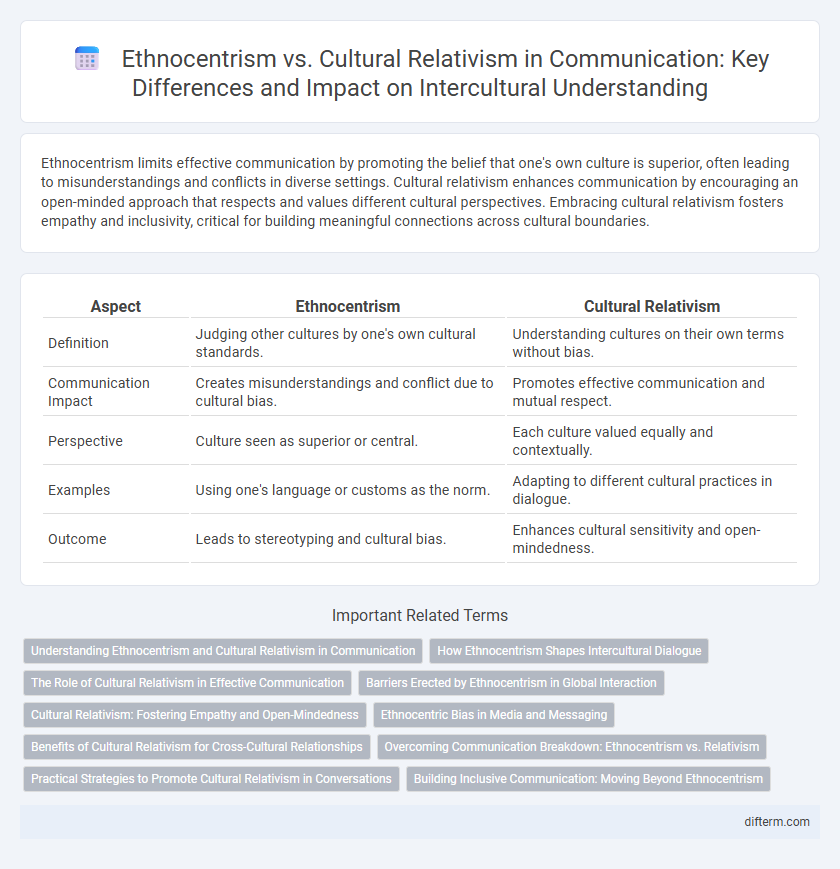Ethnocentrism limits effective communication by promoting the belief that one's own culture is superior, often leading to misunderstandings and conflicts in diverse settings. Cultural relativism enhances communication by encouraging an open-minded approach that respects and values different cultural perspectives. Embracing cultural relativism fosters empathy and inclusivity, critical for building meaningful connections across cultural boundaries.
Table of Comparison
| Aspect | Ethnocentrism | Cultural Relativism |
|---|---|---|
| Definition | Judging other cultures by one's own cultural standards. | Understanding cultures on their own terms without bias. |
| Communication Impact | Creates misunderstandings and conflict due to cultural bias. | Promotes effective communication and mutual respect. |
| Perspective | Culture seen as superior or central. | Each culture valued equally and contextually. |
| Examples | Using one's language or customs as the norm. | Adapting to different cultural practices in dialogue. |
| Outcome | Leads to stereotyping and cultural bias. | Enhances cultural sensitivity and open-mindedness. |
Understanding Ethnocentrism and Cultural Relativism in Communication
Ethnocentrism in communication involves judging other cultures by the standards of one's own, often leading to misunderstandings and bias. Cultural relativism promotes understanding cultural differences by evaluating behaviors and beliefs within their own cultural context. Effective communication requires recognizing ethnocentrism and embracing cultural relativism to foster respect and meaningful cross-cultural interactions.
How Ethnocentrism Shapes Intercultural Dialogue
Ethnocentrism shapes intercultural dialogue by creating biases that favor one's own cultural norms and values, leading to misunderstandings and conflicts. This perspective limits effective communication by fostering stereotypes and reducing openness to diverse worldviews. Emphasizing cultural relativism instead promotes empathy, allowing for more respectful and meaningful exchanges across cultural boundaries.
The Role of Cultural Relativism in Effective Communication
Cultural relativism fosters effective communication by encouraging individuals to understand and respect diverse cultural norms, reducing ethnocentric biases that often hinder meaningful interaction. Embracing cultural relativism enhances empathy and openness, allowing communicators to interpret messages within the appropriate cultural contexts and avoid misunderstandings. This approach promotes inclusive dialogue and collaboration in multicultural environments by prioritizing cultural sensitivity over judgment.
Barriers Erected by Ethnocentrism in Global Interaction
Ethnocentrism creates significant barriers in global communication by fostering judgmental attitudes that prioritize one's own cultural norms over others. This bias limits effective interaction and mutual understanding, often leading to misinterpretations and conflicts in multicultural settings. Embracing cultural relativism allows communicators to suspend ethnocentric views, promoting openness and respectful engagement across diverse cultural contexts.
Cultural Relativism: Fostering Empathy and Open-Mindedness
Cultural relativism promotes empathy by encouraging individuals to understand and appreciate cultural differences without judgment. This approach fosters open-mindedness, allowing for more effective communication across diverse cultural contexts. Embracing cultural relativism reduces ethnocentric bias and enhances global cooperation and mutual respect.
Ethnocentric Bias in Media and Messaging
Ethnocentric bias in media and messaging often leads to the misrepresentation of cultures, reinforcing stereotypes and fostering cultural misunderstandings. This bias manifests through selective storytelling and framing that prioritize one cultural perspective, usually that of the dominant group, marginalizing minority voices. Incorporating cultural relativism promotes more accurate, respectful communication by acknowledging diverse worldviews and contextual differences in media narratives.
Benefits of Cultural Relativism for Cross-Cultural Relationships
Cultural relativism fosters open-mindedness and reduces ethnocentric bias, enhancing empathy and mutual respect in cross-cultural relationships. It allows individuals to understand behaviors and values within their own cultural context, promoting effective communication and conflict resolution. Embracing cultural relativism strengthens global collaboration by encouraging inclusivity and tolerance across diverse cultural backgrounds.
Overcoming Communication Breakdown: Ethnocentrism vs. Relativism
Overcoming communication breakdown requires shifting from ethnocentrism, which judges other cultures by one's own cultural standards, to cultural relativism, embracing diverse perspectives without bias. Ethnocentrism often leads to misunderstandings and conflict by imposing one's worldview, whereas cultural relativism fosters empathy and effective intercultural dialogue. Prioritizing cultural relativism enhances communication competence in globalized environments and supports inclusive interactions.
Practical Strategies to Promote Cultural Relativism in Conversations
Promoting cultural relativism in conversations involves actively practicing empathy by seeking to understand cultural norms and values from the speaker's perspective rather than judging through one's own cultural lens. Employing open-ended questions encourages dialogue that reveals diverse worldviews, fostering respect and reducing ethnocentric biases. Creating inclusive communication environments where differing cultural expressions are validated enhances mutual understanding and bridges intercultural gaps effectively.
Building Inclusive Communication: Moving Beyond Ethnocentrism
Building inclusive communication requires recognizing and overcoming ethnocentrism, which imposes one's cultural norms as universal standards and hinders effective intercultural interactions. Embracing cultural relativism fosters understanding by evaluating behaviors and beliefs within their specific cultural contexts, enhancing empathy and reducing bias in communication. This shift promotes respectful dialogue, collaboration, and inclusivity across diverse cultural environments, essential for globalized networks and multicultural teams.
ethnocentrism vs cultural relativism Infographic

 difterm.com
difterm.com